外研版(2019)必修 第一册Unit 2 Exploring English Using language—运用·提升语言能力PPT(共61张PPT)
文档属性
| 名称 | 外研版(2019)必修 第一册Unit 2 Exploring English Using language—运用·提升语言能力PPT(共61张PPT) |  | |
| 格式 | zip | ||
| 文件大小 | 643.4KB | ||
| 资源类型 | 教案 | ||
| 版本资源 | 外研版(2019) | ||
| 科目 | 英语 | ||
| 更新时间 | 2022-12-14 08:00:56 | ||
图片预览


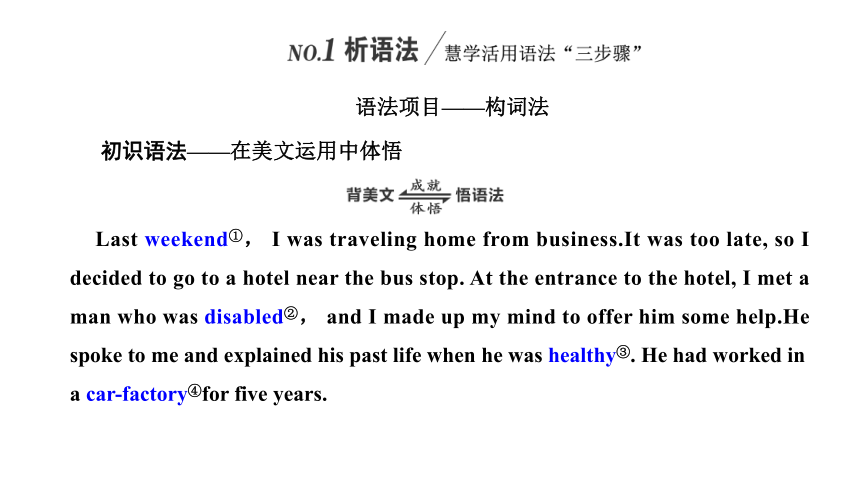
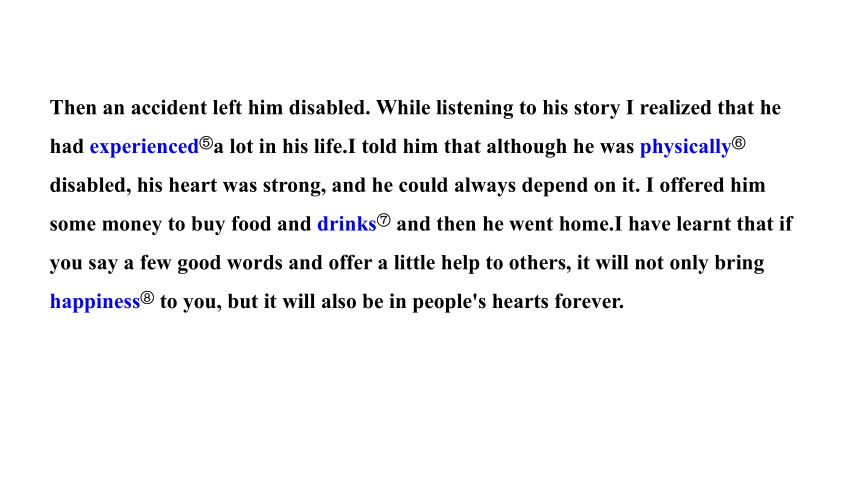
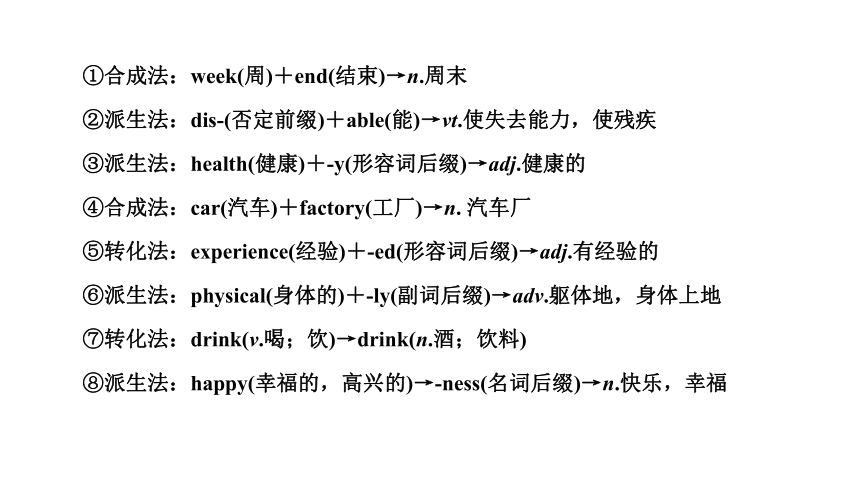
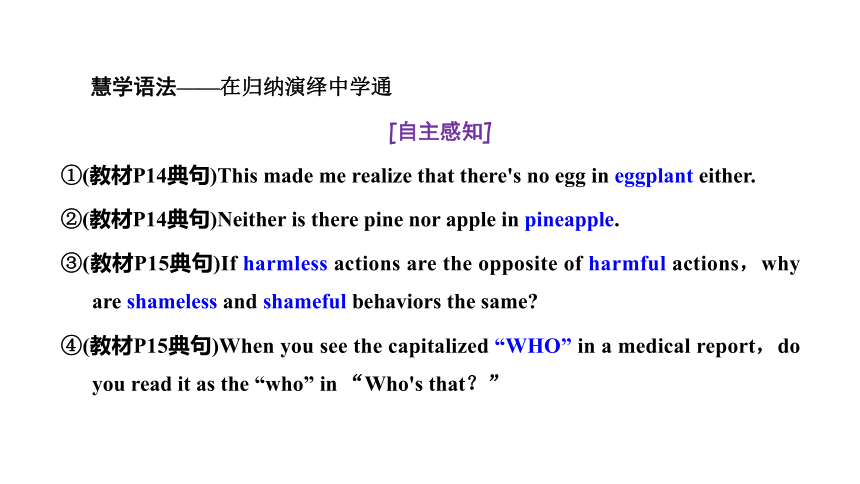
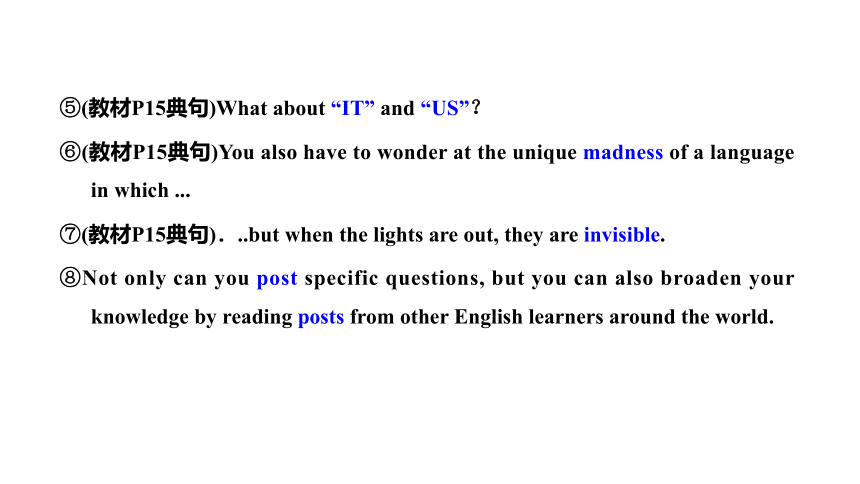
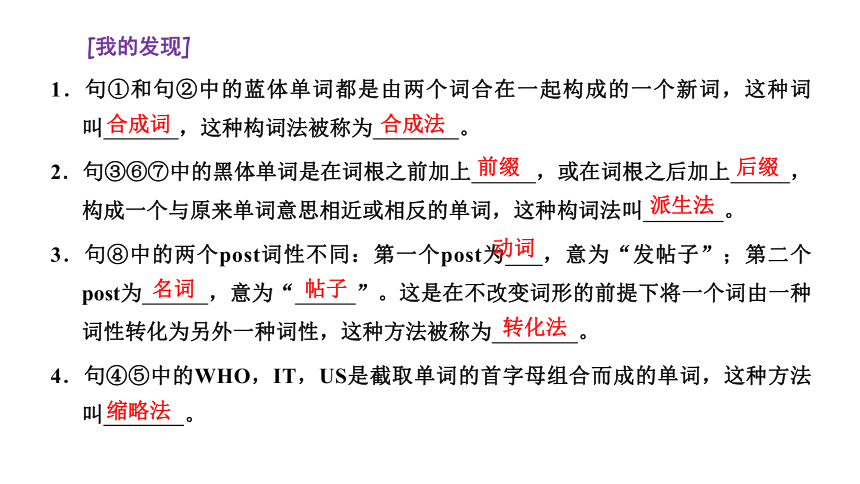

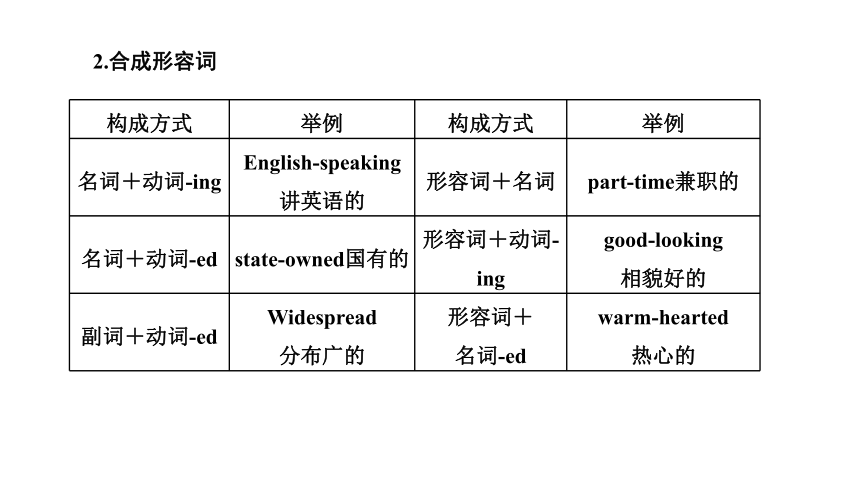
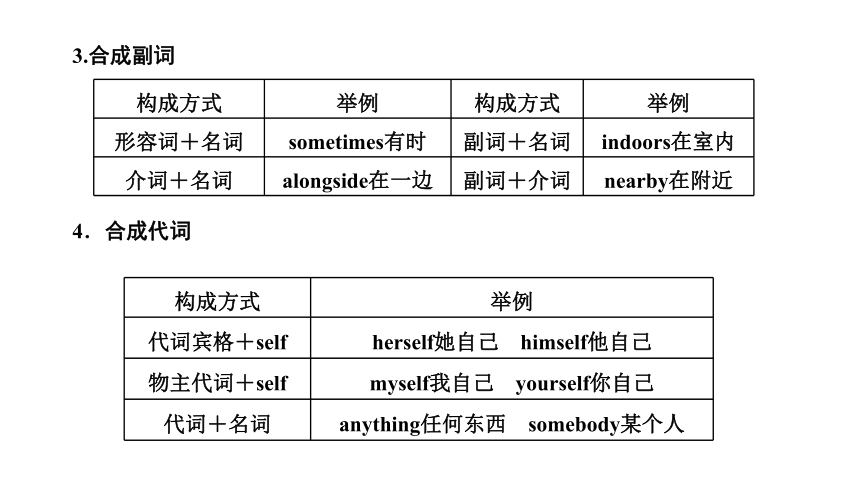
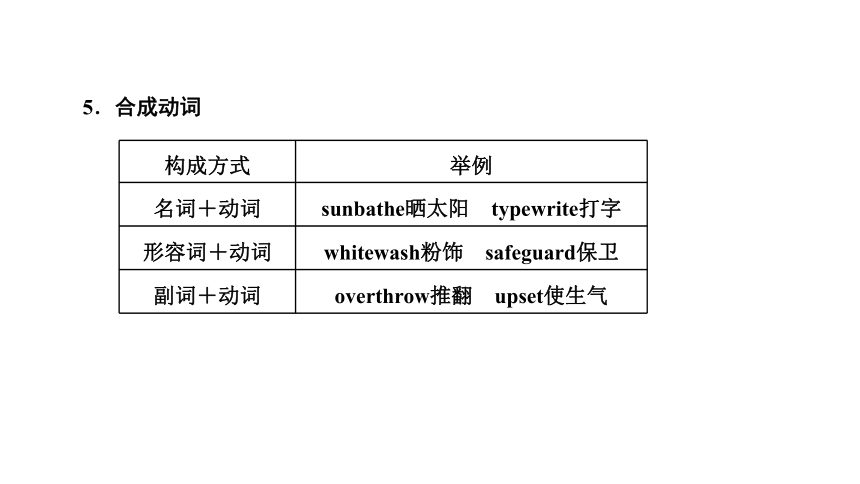
文档简介
(共61张PPT)
Using language—运用·提升语言能力
课时目标
1. 在语境中根据构词法的知识理解和使用更多的英语词汇。
2.使用工具书并自学相关构词法的语法知识,总结相关构词法的类型和基本用法。
3. 完善构词法的思维导图(合成、转化、派生、缩略等),学习利用思维导图整理信息。
4.以“汉字与单词”为主题向班级同学介绍学习汉字和单词的共性和差异,要求用到本课学到的构词法知识。
5.了解英式英语和美式英语之间的差异,如在词义、发音、拼写、语法方面等,了解、分析语言与社会经济文化发展的关系,提高分析问题的能力,以便更好地从跨文化视角观察和认识世界。
6.在交际时用相关功能表达与对方交流以消除理解障碍。
语法项目——构词法
初识语法——在美文运用中体悟
Last weekend①, I was traveling home from business.It was too late, so I decided to go to a hotel near the bus stop. At the entrance to the hotel, I met a man who was disabled②, and I made up my mind to offer him some help.He spoke to me and explained his past life when he was healthy③. He had worked in a car-factory④for five years.
Then an accident left him disabled. While listening to his story I realized that he had experienced⑤a lot in his life.I told him that although he was physically⑥ disabled, his heart was strong, and he could always depend on it. I offered him some money to buy food and drinks⑦ and then he went home.I have learnt that if you say a few good words and offer a little help to others, it will not only bring happiness⑧ to you, but it will also be in people's hearts forever.
①合成法:week(周)+end(结束)→n.周末
②派生法:dis-(否定前缀)+able(能)→vt.使失去能力,使残疾
③派生法:health(健康)+-y(形容词后缀)→adj.健康的
④合成法:car(汽车)+factory(工厂)→n. 汽车厂
⑤转化法:experience(经验)+-ed(形容词后缀)→adj.有经验的
⑥派生法:physical(身体的)+-ly(副词后缀)→adv.躯体地,身体上地
⑦转化法:drink(v.喝;饮)→drink(n.酒;饮料)
⑧派生法:happy(幸福的,高兴的)→-ness(名词后缀)→n.快乐,幸福
慧学语法——在归纳演绎中学通
[自主感知]
①(教材P14典句)This made me realize that there's no egg in eggplant either.
②(教材P14典句)Neither is there pine nor apple in pineapple.
③(教材P15典句)If harmless actions are the opposite of harmful actions,why are shameless and shameful behaviors the same
④(教材P15典句)When you see the capitalized “WHO” in a medical report,do you read it as the “who” in “Who's that?”
⑤(教材P15典句)What about “IT” and “US”?
⑥(教材P15典句)You also have to wonder at the unique madness of a language in which ...
⑦(教材P15典句)...but when the lights are out, they are invisible.
⑧Not only can you post specific questions, but you can also broaden your knowledge by reading posts from other English learners around the world.
[我的发现]
1.句①和句②中的蓝体单词都是由两个词合在一起构成的一个新词,这种词叫 ,这种构词法被称为 。
2.句③⑥⑦中的黑体单词是在词根之前加上 ,或在词根之后加上 ,构成一个与原来单词意思相近或相反的单词,这种构词法叫 。
3.句⑧中的两个post词性不同:第一个post为 ,意为“发帖子”;第二个post为 ,意为“ ”。这是在不改变词形的前提下将一个词由一种词性转化为另外一种词性,这种方法被称为 。
4.句④⑤中的WHO,IT,US是截取单词的首字母组合而成的单词,这种方法叫 。
合成词
合成法
前缀
后缀
派生法
动词
名词
帖子
转化法
缩略法
[语法规则]
英语中词的构成方法主要有三种:合成法、派生法和转化法。
一、合成法
合成法是把两个或两个以上的独立且语义不同的单词连在一起合成一个新词,有的用连字符“-”连接,有的直接写在一起,还有的由分开的两个词构成。
1.合成名词
构成方式 举例 构成方式 举例
名词+名词 weekend周末 动词+名词 postcard明信片
名词+动词 daybreak破晓 动词-ing+名词 waiting room候车室
名词+动词-ing handwriting书写 形容词+名词 fast-food快餐
2.合成形容词
构成方式 举例 构成方式 举例
名词+动词-ing English-speaking 讲英语的 形容词+名词 part-time兼职的
名词+动词-ed state-owned国有的 形容词+动词-ing good-looking
相貌好的
副词+动词-ed Widespread 分布广的 形容词+ 名词-ed warm-hearted
热心的
3.合成副词
4.合成代词
构成方式 举例 构成方式 举例
形容词+名词 sometimes有时 副词+名词 indoors在室内
介词+名词 alongside在一边 副词+介词 nearby在附近
构成方式 举例
代词宾格+self herself她自己 himself他自己
物主代词+self myself我自己 yourself你自己
代词+名词 anything任何东西 somebody某个人
5.合成动词
构成方式 举例
名词+动词 sunbathe晒太阳 typewrite打字
形容词+动词 whitewash粉饰 safeguard保卫
副词+动词 overthrow推翻 upset使生气
[名师点津]
(1)合成名词的复数形式通常是把前面的主体名词变复数。若没有主体名词,则在最后一个词后面加复数形式。例如:father-in-law→fathers-in-law, grown-up→grown-ups。
(2)由man或woman构成的合成名词变复数时,两个名词都要变成复数。例如:woman doctor→women doctors。
(3)由“名词+名词”构成的复合名词,在变复数时,只变化中心名词,而修饰名词不变。例如:girlfriend→girlfriends。
[对点练]
(1)写出下列合成词的汉语意思
①salesman _______
②snow-white _______
③hard-working _______
④blacklist _______
⑤roommate _____
⑥undergo _____
售货员
雪白的
勤劳的
黑名单
室友
经历
(2)将下列合成名词变为复数形式
①daughter-in-law→ _______________
②go-between→ ___________
③man teacher→ ____________
④Englishman→ ___________
daughters-in-law
go-betweens
men teachers
Englishmen
二、派生法
派生法是指在单词前面加上前缀或后面加上后缀而构成新词。
1.前缀
前缀一般只改变单词的意思,不改变词性。
分类 举例
常见否定 前缀 il-→illegal 非法的
un-→unhappy 不高兴的
im-→impatient 不耐烦的
dis-→disappear 消失
in-→incorrect 不正确的
non-→nonstop 不停的
ir-→irregular 不规则的
表示其他意义的常见前缀 anti-(反对;抵抗)→antiwar反战的
sub-(下面的)→subway地铁
inter-(互相)→Internet互联网
re-(再;又)→rewrite重写
en-(使……)→enrich使富足
pre-(前;预先)→preview预习
post-(后的)→postwar战后的
mid-(中;半)→midnight午夜
vice-(副的)→vice-manager副经理
micro-(微)→microscope显微镜
for-/fore-(先;预)→forecast预报
co-(共;同)→cooperation合作
mini-(小型)→miniskirt迷你裙
bi-(双的)→bimonthly两月一次的(地);一月两次的(地)
续
表
2.后缀
后缀常会改变单词的词性,构成意思相近的其他词性;少数后缀还会改变词义,变为与原来词义相反的新词。
分类 列举 举例
常见 名词 后缀 -er/-or(从事……的人), -ese(某地人), -ess(雌性), -ian(……的人), -ist(专业人员), -ism(主义), -ment(性质;状态), -ness(性质), -tion/-ation(动作;过程), -dom(状态;区域) teacher 教师
Japanese 日本人
waitress 女服务员
musician 音乐家
artist 艺术家
optimism 乐观主义
movement 运动
darkness 黑暗
invention 发明
freedom 自由
常见 动词 后缀 -en(多用于形容词后), -fy(使……化), -ize(使……成为) widen 加宽
beautify 美化
realize 意识到
常见 形容词 后缀 -al, -able, -an, -ble, -ern, -ful, -ive, -less, -like, -ly, -y, -ous, -some national 民族的
reasonable 合理的
American 美国的
careful 细心的
active 有活力的
续表
常见 副词 后缀 -ly(用于形容词后表示方式或程度), -ward(s)(表示方向) quickly 迅速地
angrily 生气地
northward(s) 朝北
upward(s) 向上
常见数 词后缀 -teen, -th, -ty thirteen 十三
fourth 第四
续表
[对点练] (单句语法填空)
①(2021·新高考Ⅰ卷)As the song goes, this long and winding road “will never
(appear)”, and it will always stick in the visitor's memory.
②(2021·新高考Ⅰ卷)The twins were filled with (excite) as they thought of the surprise they were planning for Mother's Day.
③(2021·全国乙卷)It is different from (tradition) tourism because it allows the traveler to become educated about the areas.
disappear
excitement
traditional
④(2021·浙江6月高考)In order to (rich) students' after-school life, an exhibition of students' traditional Chinese paintings is being held by our school.
⑤(2021·浙江1月高考)Wish you an (forgettable) time here! Thank you.
enrich
unforgettable
三、转化法
转化法是指把一种词性用作另一种词性而词形不变的方法。
转化 举例
名词 ↑↓ 动词 hand手/递, watch手表/观看, smoke烟/吸烟, fish鱼/钓鱼
名词 ↑↓ 形容词 light光线/轻的,wrong错误/错的,right右边/对的
动词 ↑↓ 形容词 clean打扫/干净的, close关上/近的, free使自由/自由的
副词 ↑↓ 形容词 enough足够地/足够的, last最后/最后的, hard努力地/辛苦的
读音不同, 词性不同 这些词作动词时重音在后,作名词时重音在前:contest竞赛, export出口, increase增加, permit允许, progress进步, refuse拒绝, record记录
续表
[对点练] (同义句转换)
①We had lunch together after the meeting.
→We together after the meeting.
②Let's fill the water into this bottle.
→Let's the water.
③You are so fat that you have to go on a diet.
→You are so fat that you have to .
④Snow often falls in my hometown in winter.
→It often in my hometown in winter.
lunched
bottle
diet
snows
四、截短法
截短法,即将单词缩写,词义和词性保持不变,主要有截头、去尾、截头去尾等形式。
方式 简写 全称 汉语
首部截短 phone telephone 电话
词尾截短 dorm dormitory 集体宿舍
首尾部截短 flu influenza 流行性感冒
五、首尾字母缩略法
首尾字母缩略法,即用单词首尾字母组成一个新词。读音主要有两种形式:各字母分别读音;作为一个单词读音。
缩写 全称 汉语
BBC British Broadcasting Corporation 英国广播公司
UN United Nations 联合国
VIP Very Important Person 大人物,贵宾
ID Identification Card 身份证明
IT Information Technology 信息技术
PRC People's Republic of China 中华人民共和国
WHO World Health Organization 世界卫生组织
[对点练] (写出下列缩写词)
①the Communist Party of China→ 中国共产党
②the United States→ 美国
③the Voice of America→ 美国之音
④World Wide Web→ 万维网
CPC
US
VOA
WWW
利用构词法知识,结合中英文提示补全短文
Zhang Liang, my ① (同班同学) is ② (勤奋的).To improve his listening skill, every day he gets up at six and listens to VOA (美国之音).What's more, he is also ③ (热情的) and willing to help others. On his way to school yesterday, he came across an ④_________(home) person and ⑤ (递给) some food to him.He set an example to us students.
classmate
hard-working
warm-hearted
homeless
handed
1.When you open a dictionary, you often come across a lot of unfamiliar words.
当你打开词典时,你经常会遇到许多不熟悉的单词。
★come across 偶然发现
[用法感知]
①(以文化人助写作)Life is short, and if you ever come across a beautiful, exciting, crazy moment in it, you gotta seize it while you can before that moment's gone.
人生短暂,如果你有机会碰到美丽、激动、疯狂的时刻,就在那一刻消失之前紧紧把握住。
②Something unexpected came up at the meeting yesterday.
昨天会议上发生了一些意外的事情。
③He walked up to me and said in a low voice,“Come on.You can do that.”
他走近我,低声说:“加油。你能行的。”
[归纳点拨]
come on 快点;加油;出场;进展
come out 出现;开花;出版;结果是
come up 问题、计划等被提出;升起;发生
come up with sth. 提出(计划、想法等)
[应用融会] (用come的相关短语填空)
④Based on facts,his book got well received as soon as it .
⑤When you a difficult problem, think about it by yourself first.
⑥Various suggestions at the meeting but were refused at last.
⑦When the new president came to power after the election, he a series of new policies.
came out
come across
came up
came up with
2.likely adj.可能的,可能发生的
[用法感知]
①(以文化人助写作)If you have no critics, you will likely have no success.
如果没有批评你的人,你就不大可能会成功。
②My parents are very likely not to allow me to go.
=It is very likely that my parents will not allow me to go.
我父母很可能不会让我去。
③Is it likely/possible/probable that we can finish the task in such a short time
=Is it possible for us to finish the task in such a short time
我们有可能在这么短的时间内完成这项任务吗?
归纳点拨 be likely to 有可能……;有希望……
It is likely that ... 有可能……
Sb. is likely to ... 某人有可能……
轻巧识记
[应用融会] (句型转换)
④Brian is gifted in writing music; he is very likely to be a Beethoven.
→Brian is gifted in writing music; it is to be a Beethoven.
→Brian is gifted in writing music; it is that he will be a Beethoven.
very possible for him
very likely/ possible/probable
[易混辨析] likely, possible, probable
likely 指从外表、迹象上进行判断,有可能发生。既可以用人也可以用物作主语 It is likely that ...或Sb./Sth.is likely to ...
possible 指客观上有可能,但往往含有希望很小的意味。不能用人作主语 It is possible (for sb.) to do sth.或It is possible that ...
probable 可能性比possible大,表示“很可能,十有八九”。不能用人作主语 It's probable that ..., 不能用于It's probable for sb. to do sth.这一结构
教材为基——课内听力4遍过
Step 1 过词块(英汉互译)
1. 一种传统的中国食物
2. 等等
3. 来自汉语
4. 广东方言
a kind of traditional Chinese food
and so on
come from Chinese
the Guangdong dialect
5.as well ___________
6.care about _____
7.take a look at this message _____________
8.keep up with the times _________
也;又;还
关心
看看这条信息
跟上时代
Step 2 过句式(完成句子)
1.It's a kind of traditional Chinese food from South China, .
它是一种来自中国南方的传统中餐,包括饺子、春卷、肉丸子等。
2.When you say “selfish”, you and not about other people, right
你说的“自私”是指只关心自己不关心别人,对吧?
including dumplings, spring rolls, meatballs and so on
mean only caring about yourself
3.It means using a cellphone in a way _____________________________________
_________________.
它的意思是你使用手机的方式表现出你不关心你周围的人。
4.It's a shorter .
它是“laugh out loud”的缩写。
that shows you don't care about the other
people around you
way of saying “laugh out loud”
Step 3 过关键信息[判断下列句子的正(T)误(F)]
Conversation 1:
1.“Dim sum” comes from Chinese. ( )
2.There are all kinds of noodles in dim sum. ( )
Conversation 2:
3.The boy was angry because someone was talking with him loudly on the phone. ( )
4.The girl thought that the boy was saying “selfish” at first. ( )
T
F
F
T
Conversation 3:
5.The man told Lucy a story today. ( )
6.The relationship of the two speakers may be a couple. ( )
F
T
Step 4 过文意理解
请根据所听到的内容,完成下列题目(每空最多填3个词)。该对话听2遍。
Words Meaning Origin
dim sum a kind of traditional ①____________ from ②______________
_______
③_______ using a cellphone without caring about others a combination of the words ④ and ⑤
______
⑥ ____ a shorter way of saying ⑦ ________________ from the Internet
Chinese food
the Guangdong
dialect
cellfish
cellphone
selfish
LOL
“laugh out loud”
训练为重——能力提升多听说
一、听力仿真训练
Ⅰ. 听下面5段对话。每段对话后有一个小题,从题中所给的A、B、C三个选项中选出最佳选项。听完每段对话后,你都有10秒钟的时间来回答有关小题和阅读下一小题。每段对话仅读一遍。
1.What does the girl think of spoken English
A.Interesting. B.Useful. C.Useless.
2.What difficulty does the woman have in learning English
A.Pronunciation. B.Grammar. C.Spelling.
3.Why does Mark look unhappy
A.Because he was punished by his teacher.
B.Because he didn't pass the English exam.
C.Because he is worried about his English.
4.Who might Mr Peterson be
A.A new professor.
B.A department head.
C.A company director.
5.Who is likely to have an electronic dictionary
A.Jimmy. B.The woman. C.The man.
Ⅱ.听下面2段对话或独白。每段对话或独白后有几个小题,从题中所给的A、B、C三个选项中选出最佳选项。听每段对话或独白前,你将有时间阅读各个小题,每小题5秒钟;听完后,各小题将给出5秒钟的作答时间。每段对话或独白读两遍。
听第6段材料,回答第6至8题。
6.Why does the woman like San Francisco
A.It has less traffic.
B.People there are friendlier.
C.It has the best food and music.
7.Where does the woman come from
A.Pennsylvania. B.San Francisco. C.China.
8.What does the woman think of the man's English
A.Excellent. B.Acceptable. C.Strange.
听第7段材料,回答第9至12题。
9.What does the speaker mainly talk about
A.The plan for today.
B.The language skills.
C.An introduction of the center.
10.How many parts does the test include
A.Three. B.Four. C.Five.
11.When can the listeners ask quite a few questions
A.After the speaker finishes his talk.
B.When they meet in small groups.
C.When they take a campus tour.
12.What will the listeners do this afternoon
A.Take a campus tour.
B.Get into small classes.
C.Begin their first lesson.
答案:1~5 BCCCA 6~8 CAA 9~12 ABBA
听力材料:
(Text 1)
W:Do you mean to tell me you are not interested in spoken English
M:That's right. ①I think it's of no use.
W:①I can't agree with you.
(Text 2 )
W:You know, Jack, since I started speaking English all the time, my pronunciation's getting better and even the grammar's beginning to make some sense. ②But I don't think I'll ever be able to spell.
M:You're not alone there. I have trouble with spelling, too.
(Text 3)
W:What's the matter, Mark You don't look very happy.
M:I'm not. ③I'm worried about my English.
W:What's the problem
M:I'm not practicing enough.
(Text 4)
W:Did you hear that Mr Peterson is coming next week, Gordon
M: Yes. ④So I called all of the department heads to my office this morning. We need to give him reports on our program.
(Text 5)
M:Excuse me. Do you have an electronic dictionary
W:I'm afraid not. ⑤Why don't you go and ask Jimmy I saw one on his desk minutes ago.
(Text 6)
M:Excuse me, do you mind if I sit here
W:No, not at all. Go ahead.
M:Thank you.
W:Are you going somewhere or meeting someone
M:I am on my way to Washington. And you
W:I am on my way to San Francisco.
M:Really I think San Francisco is probably the most exciting city in the US.
W:So do I. ⑥No other city has as many good restaurants or as much good music.
M:Is San Francisco your hometown
W:⑦I am from a very small town in Pennsylvania. I wouldn't want to live there again, either. I don't like to live in a small town very much.
M:Neither do I. But small towns have their advantages: less traffic.
W:And friendlier people. You know, I'm beginning to feel homesick. By the way, where are you from
M:China.
W:China ⑧But you speak English like a native speaker. I didn't have any idea.
M:Thank you! Oh, excuse me. It's time for my flight. Well, it's been nice talking with you.
W:Me too. Bye!
(Text 7)
M:Hello everybody. Welcome to the American Language Center. I'm Peter Riely, your academic advisor. Today is your first day at our school. Please listen very carefully because we're going to give you a lot of important information that will make your experience here enjoyable and useful. OK, here we go.
⑨Let me tell you about the plan for today. There are three things on your schedule. First, you will take a test. This test will measure your English level. ⑩You'll take a reading, grammar, and composition test. Oh, and also a listening test. The whole test takes three hours. Next, you will meet in small groups, with teacher. This meeting will be about important things you need to know, like that. This is where you can ask a lot of questions. Then, finally, this afternoon, you will take a campus tour. We'll show you the main buildings where your classrooms are; you'll see some of the sports facilities, you know, the tennis courts, the swimming pool, places like that; and you'll also visit the library and the computer lab. I think you'll be surprised how large and how beautiful our campus is. All right. Are there any questions before we begin
?加练新题型
听力填空(再听第7段材料两遍,完成下面的题目)
After you hear the short passage, decide whether each of the statements is correct (A), incorrect (B) or not mentioned (C).
1.The listeners will have an English test first. A B C
2.In the test, the listeners must talk with the teacher in English. A B C
3.The listeners have known where their classrooms are now. A B C
4.The listeners like their dormitory very much after visiting it. A B C
答案:1~4 ACBC
二、口语交际训练
Ⅰ.补全对话
A和B两个人正在讨论美式英语和英式英语的区别……
A:American English today ① (和英式英语不同) in several ways.
B:Yes, it is mostly in ② (拼写和词汇).
A:Can you list some examples of different spellings in American and British English
B:③ (theatre 是英式英语的拼写,而theater 是美式英语的拼写).
is different from British English
spelling and vocabulary
Theatre is spelt in British English while theater in American English
A:Can you share me some differences in vocabulary
B:For example, Americans talk about ④ (给汽车加油),and ⑤ (沿公路行驶), whereas in the UK, people talk about putting petrol in their cars and driving along the motorway.
A:Does it ⑥ (让美国人困惑) when he is in England
B:Usually people from the two countries can understand each other from the context.
putting gas in their cars
driving along the high way
make an American confused
Ⅱ.在校园中有许多学生对于是学习美式英语还是学习英式英语而感到困惑。请你谈谈该如何选择呢?
Hello friends! There are many kinds of English, such as Australian, South
Africanand Indian English, as well as British and American English. There are
Small differences in spelling, grammar, vocabulary and pronunciation. Everyone
has a different accent but it's all the same language. When you speak English, you
don't have to sound American or British. All you have to do is to speak clearly,
so that people can understand you. English is a language of international
communication. It belongs to everyone.
“课时跟踪检测”见“课时跟踪检测(二)”
(单击进入电子文档)
Using language—运用·提升语言能力
课时目标
1. 在语境中根据构词法的知识理解和使用更多的英语词汇。
2.使用工具书并自学相关构词法的语法知识,总结相关构词法的类型和基本用法。
3. 完善构词法的思维导图(合成、转化、派生、缩略等),学习利用思维导图整理信息。
4.以“汉字与单词”为主题向班级同学介绍学习汉字和单词的共性和差异,要求用到本课学到的构词法知识。
5.了解英式英语和美式英语之间的差异,如在词义、发音、拼写、语法方面等,了解、分析语言与社会经济文化发展的关系,提高分析问题的能力,以便更好地从跨文化视角观察和认识世界。
6.在交际时用相关功能表达与对方交流以消除理解障碍。
语法项目——构词法
初识语法——在美文运用中体悟
Last weekend①, I was traveling home from business.It was too late, so I decided to go to a hotel near the bus stop. At the entrance to the hotel, I met a man who was disabled②, and I made up my mind to offer him some help.He spoke to me and explained his past life when he was healthy③. He had worked in a car-factory④for five years.
Then an accident left him disabled. While listening to his story I realized that he had experienced⑤a lot in his life.I told him that although he was physically⑥ disabled, his heart was strong, and he could always depend on it. I offered him some money to buy food and drinks⑦ and then he went home.I have learnt that if you say a few good words and offer a little help to others, it will not only bring happiness⑧ to you, but it will also be in people's hearts forever.
①合成法:week(周)+end(结束)→n.周末
②派生法:dis-(否定前缀)+able(能)→vt.使失去能力,使残疾
③派生法:health(健康)+-y(形容词后缀)→adj.健康的
④合成法:car(汽车)+factory(工厂)→n. 汽车厂
⑤转化法:experience(经验)+-ed(形容词后缀)→adj.有经验的
⑥派生法:physical(身体的)+-ly(副词后缀)→adv.躯体地,身体上地
⑦转化法:drink(v.喝;饮)→drink(n.酒;饮料)
⑧派生法:happy(幸福的,高兴的)→-ness(名词后缀)→n.快乐,幸福
慧学语法——在归纳演绎中学通
[自主感知]
①(教材P14典句)This made me realize that there's no egg in eggplant either.
②(教材P14典句)Neither is there pine nor apple in pineapple.
③(教材P15典句)If harmless actions are the opposite of harmful actions,why are shameless and shameful behaviors the same
④(教材P15典句)When you see the capitalized “WHO” in a medical report,do you read it as the “who” in “Who's that?”
⑤(教材P15典句)What about “IT” and “US”?
⑥(教材P15典句)You also have to wonder at the unique madness of a language in which ...
⑦(教材P15典句)...but when the lights are out, they are invisible.
⑧Not only can you post specific questions, but you can also broaden your knowledge by reading posts from other English learners around the world.
[我的发现]
1.句①和句②中的蓝体单词都是由两个词合在一起构成的一个新词,这种词叫 ,这种构词法被称为 。
2.句③⑥⑦中的黑体单词是在词根之前加上 ,或在词根之后加上 ,构成一个与原来单词意思相近或相反的单词,这种构词法叫 。
3.句⑧中的两个post词性不同:第一个post为 ,意为“发帖子”;第二个post为 ,意为“ ”。这是在不改变词形的前提下将一个词由一种词性转化为另外一种词性,这种方法被称为 。
4.句④⑤中的WHO,IT,US是截取单词的首字母组合而成的单词,这种方法叫 。
合成词
合成法
前缀
后缀
派生法
动词
名词
帖子
转化法
缩略法
[语法规则]
英语中词的构成方法主要有三种:合成法、派生法和转化法。
一、合成法
合成法是把两个或两个以上的独立且语义不同的单词连在一起合成一个新词,有的用连字符“-”连接,有的直接写在一起,还有的由分开的两个词构成。
1.合成名词
构成方式 举例 构成方式 举例
名词+名词 weekend周末 动词+名词 postcard明信片
名词+动词 daybreak破晓 动词-ing+名词 waiting room候车室
名词+动词-ing handwriting书写 形容词+名词 fast-food快餐
2.合成形容词
构成方式 举例 构成方式 举例
名词+动词-ing English-speaking 讲英语的 形容词+名词 part-time兼职的
名词+动词-ed state-owned国有的 形容词+动词-ing good-looking
相貌好的
副词+动词-ed Widespread 分布广的 形容词+ 名词-ed warm-hearted
热心的
3.合成副词
4.合成代词
构成方式 举例 构成方式 举例
形容词+名词 sometimes有时 副词+名词 indoors在室内
介词+名词 alongside在一边 副词+介词 nearby在附近
构成方式 举例
代词宾格+self herself她自己 himself他自己
物主代词+self myself我自己 yourself你自己
代词+名词 anything任何东西 somebody某个人
5.合成动词
构成方式 举例
名词+动词 sunbathe晒太阳 typewrite打字
形容词+动词 whitewash粉饰 safeguard保卫
副词+动词 overthrow推翻 upset使生气
[名师点津]
(1)合成名词的复数形式通常是把前面的主体名词变复数。若没有主体名词,则在最后一个词后面加复数形式。例如:father-in-law→fathers-in-law, grown-up→grown-ups。
(2)由man或woman构成的合成名词变复数时,两个名词都要变成复数。例如:woman doctor→women doctors。
(3)由“名词+名词”构成的复合名词,在变复数时,只变化中心名词,而修饰名词不变。例如:girlfriend→girlfriends。
[对点练]
(1)写出下列合成词的汉语意思
①salesman _______
②snow-white _______
③hard-working _______
④blacklist _______
⑤roommate _____
⑥undergo _____
售货员
雪白的
勤劳的
黑名单
室友
经历
(2)将下列合成名词变为复数形式
①daughter-in-law→ _______________
②go-between→ ___________
③man teacher→ ____________
④Englishman→ ___________
daughters-in-law
go-betweens
men teachers
Englishmen
二、派生法
派生法是指在单词前面加上前缀或后面加上后缀而构成新词。
1.前缀
前缀一般只改变单词的意思,不改变词性。
分类 举例
常见否定 前缀 il-→illegal 非法的
un-→unhappy 不高兴的
im-→impatient 不耐烦的
dis-→disappear 消失
in-→incorrect 不正确的
non-→nonstop 不停的
ir-→irregular 不规则的
表示其他意义的常见前缀 anti-(反对;抵抗)→antiwar反战的
sub-(下面的)→subway地铁
inter-(互相)→Internet互联网
re-(再;又)→rewrite重写
en-(使……)→enrich使富足
pre-(前;预先)→preview预习
post-(后的)→postwar战后的
mid-(中;半)→midnight午夜
vice-(副的)→vice-manager副经理
micro-(微)→microscope显微镜
for-/fore-(先;预)→forecast预报
co-(共;同)→cooperation合作
mini-(小型)→miniskirt迷你裙
bi-(双的)→bimonthly两月一次的(地);一月两次的(地)
续
表
2.后缀
后缀常会改变单词的词性,构成意思相近的其他词性;少数后缀还会改变词义,变为与原来词义相反的新词。
分类 列举 举例
常见 名词 后缀 -er/-or(从事……的人), -ese(某地人), -ess(雌性), -ian(……的人), -ist(专业人员), -ism(主义), -ment(性质;状态), -ness(性质), -tion/-ation(动作;过程), -dom(状态;区域) teacher 教师
Japanese 日本人
waitress 女服务员
musician 音乐家
artist 艺术家
optimism 乐观主义
movement 运动
darkness 黑暗
invention 发明
freedom 自由
常见 动词 后缀 -en(多用于形容词后), -fy(使……化), -ize(使……成为) widen 加宽
beautify 美化
realize 意识到
常见 形容词 后缀 -al, -able, -an, -ble, -ern, -ful, -ive, -less, -like, -ly, -y, -ous, -some national 民族的
reasonable 合理的
American 美国的
careful 细心的
active 有活力的
续表
常见 副词 后缀 -ly(用于形容词后表示方式或程度), -ward(s)(表示方向) quickly 迅速地
angrily 生气地
northward(s) 朝北
upward(s) 向上
常见数 词后缀 -teen, -th, -ty thirteen 十三
fourth 第四
续表
[对点练] (单句语法填空)
①(2021·新高考Ⅰ卷)As the song goes, this long and winding road “will never
(appear)”, and it will always stick in the visitor's memory.
②(2021·新高考Ⅰ卷)The twins were filled with (excite) as they thought of the surprise they were planning for Mother's Day.
③(2021·全国乙卷)It is different from (tradition) tourism because it allows the traveler to become educated about the areas.
disappear
excitement
traditional
④(2021·浙江6月高考)In order to (rich) students' after-school life, an exhibition of students' traditional Chinese paintings is being held by our school.
⑤(2021·浙江1月高考)Wish you an (forgettable) time here! Thank you.
enrich
unforgettable
三、转化法
转化法是指把一种词性用作另一种词性而词形不变的方法。
转化 举例
名词 ↑↓ 动词 hand手/递, watch手表/观看, smoke烟/吸烟, fish鱼/钓鱼
名词 ↑↓ 形容词 light光线/轻的,wrong错误/错的,right右边/对的
动词 ↑↓ 形容词 clean打扫/干净的, close关上/近的, free使自由/自由的
副词 ↑↓ 形容词 enough足够地/足够的, last最后/最后的, hard努力地/辛苦的
读音不同, 词性不同 这些词作动词时重音在后,作名词时重音在前:contest竞赛, export出口, increase增加, permit允许, progress进步, refuse拒绝, record记录
续表
[对点练] (同义句转换)
①We had lunch together after the meeting.
→We together after the meeting.
②Let's fill the water into this bottle.
→Let's the water.
③You are so fat that you have to go on a diet.
→You are so fat that you have to .
④Snow often falls in my hometown in winter.
→It often in my hometown in winter.
lunched
bottle
diet
snows
四、截短法
截短法,即将单词缩写,词义和词性保持不变,主要有截头、去尾、截头去尾等形式。
方式 简写 全称 汉语
首部截短 phone telephone 电话
词尾截短 dorm dormitory 集体宿舍
首尾部截短 flu influenza 流行性感冒
五、首尾字母缩略法
首尾字母缩略法,即用单词首尾字母组成一个新词。读音主要有两种形式:各字母分别读音;作为一个单词读音。
缩写 全称 汉语
BBC British Broadcasting Corporation 英国广播公司
UN United Nations 联合国
VIP Very Important Person 大人物,贵宾
ID Identification Card 身份证明
IT Information Technology 信息技术
PRC People's Republic of China 中华人民共和国
WHO World Health Organization 世界卫生组织
[对点练] (写出下列缩写词)
①the Communist Party of China→ 中国共产党
②the United States→ 美国
③the Voice of America→ 美国之音
④World Wide Web→ 万维网
CPC
US
VOA
WWW
利用构词法知识,结合中英文提示补全短文
Zhang Liang, my ① (同班同学) is ② (勤奋的).To improve his listening skill, every day he gets up at six and listens to VOA (美国之音).What's more, he is also ③ (热情的) and willing to help others. On his way to school yesterday, he came across an ④_________(home) person and ⑤ (递给) some food to him.He set an example to us students.
classmate
hard-working
warm-hearted
homeless
handed
1.When you open a dictionary, you often come across a lot of unfamiliar words.
当你打开词典时,你经常会遇到许多不熟悉的单词。
★come across 偶然发现
[用法感知]
①(以文化人助写作)Life is short, and if you ever come across a beautiful, exciting, crazy moment in it, you gotta seize it while you can before that moment's gone.
人生短暂,如果你有机会碰到美丽、激动、疯狂的时刻,就在那一刻消失之前紧紧把握住。
②Something unexpected came up at the meeting yesterday.
昨天会议上发生了一些意外的事情。
③He walked up to me and said in a low voice,“Come on.You can do that.”
他走近我,低声说:“加油。你能行的。”
[归纳点拨]
come on 快点;加油;出场;进展
come out 出现;开花;出版;结果是
come up 问题、计划等被提出;升起;发生
come up with sth. 提出(计划、想法等)
[应用融会] (用come的相关短语填空)
④Based on facts,his book got well received as soon as it .
⑤When you a difficult problem, think about it by yourself first.
⑥Various suggestions at the meeting but were refused at last.
⑦When the new president came to power after the election, he a series of new policies.
came out
come across
came up
came up with
2.likely adj.可能的,可能发生的
[用法感知]
①(以文化人助写作)If you have no critics, you will likely have no success.
如果没有批评你的人,你就不大可能会成功。
②My parents are very likely not to allow me to go.
=It is very likely that my parents will not allow me to go.
我父母很可能不会让我去。
③Is it likely/possible/probable that we can finish the task in such a short time
=Is it possible for us to finish the task in such a short time
我们有可能在这么短的时间内完成这项任务吗?
归纳点拨 be likely to 有可能……;有希望……
It is likely that ... 有可能……
Sb. is likely to ... 某人有可能……
轻巧识记
[应用融会] (句型转换)
④Brian is gifted in writing music; he is very likely to be a Beethoven.
→Brian is gifted in writing music; it is to be a Beethoven.
→Brian is gifted in writing music; it is that he will be a Beethoven.
very possible for him
very likely/ possible/probable
[易混辨析] likely, possible, probable
likely 指从外表、迹象上进行判断,有可能发生。既可以用人也可以用物作主语 It is likely that ...或Sb./Sth.is likely to ...
possible 指客观上有可能,但往往含有希望很小的意味。不能用人作主语 It is possible (for sb.) to do sth.或It is possible that ...
probable 可能性比possible大,表示“很可能,十有八九”。不能用人作主语 It's probable that ..., 不能用于It's probable for sb. to do sth.这一结构
教材为基——课内听力4遍过
Step 1 过词块(英汉互译)
1. 一种传统的中国食物
2. 等等
3. 来自汉语
4. 广东方言
a kind of traditional Chinese food
and so on
come from Chinese
the Guangdong dialect
5.as well ___________
6.care about _____
7.take a look at this message _____________
8.keep up with the times _________
也;又;还
关心
看看这条信息
跟上时代
Step 2 过句式(完成句子)
1.It's a kind of traditional Chinese food from South China, .
它是一种来自中国南方的传统中餐,包括饺子、春卷、肉丸子等。
2.When you say “selfish”, you and not about other people, right
你说的“自私”是指只关心自己不关心别人,对吧?
including dumplings, spring rolls, meatballs and so on
mean only caring about yourself
3.It means using a cellphone in a way _____________________________________
_________________.
它的意思是你使用手机的方式表现出你不关心你周围的人。
4.It's a shorter .
它是“laugh out loud”的缩写。
that shows you don't care about the other
people around you
way of saying “laugh out loud”
Step 3 过关键信息[判断下列句子的正(T)误(F)]
Conversation 1:
1.“Dim sum” comes from Chinese. ( )
2.There are all kinds of noodles in dim sum. ( )
Conversation 2:
3.The boy was angry because someone was talking with him loudly on the phone. ( )
4.The girl thought that the boy was saying “selfish” at first. ( )
T
F
F
T
Conversation 3:
5.The man told Lucy a story today. ( )
6.The relationship of the two speakers may be a couple. ( )
F
T
Step 4 过文意理解
请根据所听到的内容,完成下列题目(每空最多填3个词)。该对话听2遍。
Words Meaning Origin
dim sum a kind of traditional ①____________ from ②______________
_______
③_______ using a cellphone without caring about others a combination of the words ④ and ⑤
______
⑥ ____ a shorter way of saying ⑦ ________________ from the Internet
Chinese food
the Guangdong
dialect
cellfish
cellphone
selfish
LOL
“laugh out loud”
训练为重——能力提升多听说
一、听力仿真训练
Ⅰ. 听下面5段对话。每段对话后有一个小题,从题中所给的A、B、C三个选项中选出最佳选项。听完每段对话后,你都有10秒钟的时间来回答有关小题和阅读下一小题。每段对话仅读一遍。
1.What does the girl think of spoken English
A.Interesting. B.Useful. C.Useless.
2.What difficulty does the woman have in learning English
A.Pronunciation. B.Grammar. C.Spelling.
3.Why does Mark look unhappy
A.Because he was punished by his teacher.
B.Because he didn't pass the English exam.
C.Because he is worried about his English.
4.Who might Mr Peterson be
A.A new professor.
B.A department head.
C.A company director.
5.Who is likely to have an electronic dictionary
A.Jimmy. B.The woman. C.The man.
Ⅱ.听下面2段对话或独白。每段对话或独白后有几个小题,从题中所给的A、B、C三个选项中选出最佳选项。听每段对话或独白前,你将有时间阅读各个小题,每小题5秒钟;听完后,各小题将给出5秒钟的作答时间。每段对话或独白读两遍。
听第6段材料,回答第6至8题。
6.Why does the woman like San Francisco
A.It has less traffic.
B.People there are friendlier.
C.It has the best food and music.
7.Where does the woman come from
A.Pennsylvania. B.San Francisco. C.China.
8.What does the woman think of the man's English
A.Excellent. B.Acceptable. C.Strange.
听第7段材料,回答第9至12题。
9.What does the speaker mainly talk about
A.The plan for today.
B.The language skills.
C.An introduction of the center.
10.How many parts does the test include
A.Three. B.Four. C.Five.
11.When can the listeners ask quite a few questions
A.After the speaker finishes his talk.
B.When they meet in small groups.
C.When they take a campus tour.
12.What will the listeners do this afternoon
A.Take a campus tour.
B.Get into small classes.
C.Begin their first lesson.
答案:1~5 BCCCA 6~8 CAA 9~12 ABBA
听力材料:
(Text 1)
W:Do you mean to tell me you are not interested in spoken English
M:That's right. ①I think it's of no use.
W:①I can't agree with you.
(Text 2 )
W:You know, Jack, since I started speaking English all the time, my pronunciation's getting better and even the grammar's beginning to make some sense. ②But I don't think I'll ever be able to spell.
M:You're not alone there. I have trouble with spelling, too.
(Text 3)
W:What's the matter, Mark You don't look very happy.
M:I'm not. ③I'm worried about my English.
W:What's the problem
M:I'm not practicing enough.
(Text 4)
W:Did you hear that Mr Peterson is coming next week, Gordon
M: Yes. ④So I called all of the department heads to my office this morning. We need to give him reports on our program.
(Text 5)
M:Excuse me. Do you have an electronic dictionary
W:I'm afraid not. ⑤Why don't you go and ask Jimmy I saw one on his desk minutes ago.
(Text 6)
M:Excuse me, do you mind if I sit here
W:No, not at all. Go ahead.
M:Thank you.
W:Are you going somewhere or meeting someone
M:I am on my way to Washington. And you
W:I am on my way to San Francisco.
M:Really I think San Francisco is probably the most exciting city in the US.
W:So do I. ⑥No other city has as many good restaurants or as much good music.
M:Is San Francisco your hometown
W:⑦I am from a very small town in Pennsylvania. I wouldn't want to live there again, either. I don't like to live in a small town very much.
M:Neither do I. But small towns have their advantages: less traffic.
W:And friendlier people. You know, I'm beginning to feel homesick. By the way, where are you from
M:China.
W:China ⑧But you speak English like a native speaker. I didn't have any idea.
M:Thank you! Oh, excuse me. It's time for my flight. Well, it's been nice talking with you.
W:Me too. Bye!
(Text 7)
M:Hello everybody. Welcome to the American Language Center. I'm Peter Riely, your academic advisor. Today is your first day at our school. Please listen very carefully because we're going to give you a lot of important information that will make your experience here enjoyable and useful. OK, here we go.
⑨Let me tell you about the plan for today. There are three things on your schedule. First, you will take a test. This test will measure your English level. ⑩You'll take a reading, grammar, and composition test. Oh, and also a listening test. The whole test takes three hours. Next, you will meet in small groups, with teacher. This meeting will be about important things you need to know, like that. This is where you can ask a lot of questions. Then, finally, this afternoon, you will take a campus tour. We'll show you the main buildings where your classrooms are; you'll see some of the sports facilities, you know, the tennis courts, the swimming pool, places like that; and you'll also visit the library and the computer lab. I think you'll be surprised how large and how beautiful our campus is. All right. Are there any questions before we begin
?加练新题型
听力填空(再听第7段材料两遍,完成下面的题目)
After you hear the short passage, decide whether each of the statements is correct (A), incorrect (B) or not mentioned (C).
1.The listeners will have an English test first. A B C
2.In the test, the listeners must talk with the teacher in English. A B C
3.The listeners have known where their classrooms are now. A B C
4.The listeners like their dormitory very much after visiting it. A B C
答案:1~4 ACBC
二、口语交际训练
Ⅰ.补全对话
A和B两个人正在讨论美式英语和英式英语的区别……
A:American English today ① (和英式英语不同) in several ways.
B:Yes, it is mostly in ② (拼写和词汇).
A:Can you list some examples of different spellings in American and British English
B:③ (theatre 是英式英语的拼写,而theater 是美式英语的拼写).
is different from British English
spelling and vocabulary
Theatre is spelt in British English while theater in American English
A:Can you share me some differences in vocabulary
B:For example, Americans talk about ④ (给汽车加油),and ⑤ (沿公路行驶), whereas in the UK, people talk about putting petrol in their cars and driving along the motorway.
A:Does it ⑥ (让美国人困惑) when he is in England
B:Usually people from the two countries can understand each other from the context.
putting gas in their cars
driving along the high way
make an American confused
Ⅱ.在校园中有许多学生对于是学习美式英语还是学习英式英语而感到困惑。请你谈谈该如何选择呢?
Hello friends! There are many kinds of English, such as Australian, South
Africanand Indian English, as well as British and American English. There are
Small differences in spelling, grammar, vocabulary and pronunciation. Everyone
has a different accent but it's all the same language. When you speak English, you
don't have to sound American or British. All you have to do is to speak clearly,
so that people can understand you. English is a language of international
communication. It belongs to everyone.
“课时跟踪检测”见“课时跟踪检测(二)”
(单击进入电子文档)
